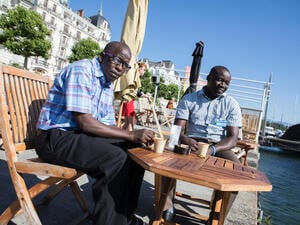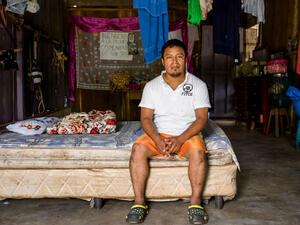Q&A: The huge challenges facing humanitarian workers in Somalia
Q&A: The huge challenges facing humanitarian workers in Somalia

Keynaan on arrival in Nairobi from Mogadishu last month.
NAIROBI, Kenya, September 12 (UNHCR) - On June 21, Hassan Mohammed Ali became the latest victim of the wave of kidnappings targeting humanitarian workers in the Somali capital of Mogadishu. The UN refugee agency was especially concerned - Ali, better known as Keynaan, was the head of their Mogadishu office, which has been doing vital work helping many of the hundreds of thousands of people displaced by the latest flare-up in Somalia's long conflict. Other aid workers had been killed by their captors, but UNHCR held out hope for Keynaan. On August 27, this brave, intelligent and selfless Somali man was released and flown to Nairobi, where he has been receiving medical treatment and rest. He spoke to UNHCR Public Information Officer Catherine Weibel. Excerpts from the interview:
How do you feel after two months in captivity?
I am extremely tired but in good health. I told my captors each day that I was a humanitarian worker who only wanted to help relieve the suffering of innocent civilians in an impartial manner. What greatly helped me was when we learned that thousands of internally displaced people (IDPs) were demonstrating in and around Mogadishu, calling for my release. When I was finally set free, a thick crowd of IDPs who had heard the news on a local radio station gathered around the UN compound to cheer me up. I could hear them all night long. It felt good, because I realized they knew how hard I had worked all these years to advocate for their rights.
When did you join UNHCR?
I have been working for the UN refugee agency for the past 16 years. Before joining in 1993, I headed a department at the Somali Ministry of Labour and Social Affairs. When the government [of President Siad Barre] collapsed in 1991, I lost my job. Sometimes I look at photos of me and my colleagues attending international conferences right before the chaos began. Almost all of them have left Somalia and are now living abroad. I am the only one who still lives in our country. As a student, I spent three years in the United States and I also studied in Iraq. I thought that it was impossible to provide for a large family abroad, so I decided to remain in Somalia, where I thought that I would be able to offer a better life to my wife and to our nine children.
Tell us about the situation in Mogadishu over these 16 years?
A few months after I joined UNHCR in 1993, the violence flared up and all international staff had to be evacuated. I found myself in charge of the Mogadishu office, having to cater to the administrative tasks as well as bring support to refugees and IDPs who, at that time, had travelled to Mogadishu in search of safety. In 2000, people began to hope for a better future and we helped 6,000 Somali refugees to come back from Djibouti and settle in Mogadishu. Unhappily, those hopes were short-lived and soon people began to leave the capital again. In February 2007, violence engulfed Mogadishu, setting 850,000 people on the road.
How did you carry on working in such an unstable environment?
I needed my job to be able to support my family. Plus I felt happy each time UNHCR delivered aid to refugees or IDPs, no matter how small, because the beneficiaries really needed it. You can't imagine how thankful people can be when they are given even a simple plastic sheet, because it means their family won't be drenched by the rain and their children won't become sick.
Last year, UNHCR gave non-food items such as plastic sheeting, sleeping mats or jerry cans to 100,000 IDPs around Afgooye [a town located some 30 kilometres to the west of Mogadishu]. This year I supervised the distribution of aid to 40,000 people. We were about to proceed to a second round of distribution for another 40,000 IDPs when I was abducted. Even if there is never enough aid for all the people in need, you're still making a difference in their lives.
Didn't you become an IDP yourself last year?
In March 2007, the fighting came so close to my house that the walls were scarred by bullets. I had to help my family flee the capital with just the clothes on our backs - we could not take any of our belongings with us. Still, we were better off than many of the other IDPs, because we were lucky enough to own a small piece of land near Afgooye. My children had a roof over their head, while many IDP children had to sleep outside, hoping that the rain would not come at night.
How difficult was it to see so many of your countrymen made homeless?
I feel pity each time that I visit an IDP settlement in Mogadishu, because some of these people are utterly desperate. They are so numerous that we cannot afford to give aid to each of them. Usually we ask the elders leading the IPD communities to help us identify the most vulnerable of the IDPs, who receive aid in priority. We know that all the others suffer as well, but we can only pray that we will soon be able to organize another round of distribution for them.
Over the past months, I have met many IDPs who had lost relatives in crossfire and indiscriminate shelling. I can't forget this nine-year-old girl who was being raised by her neighbours. She was the only member of her family who survived when a mortar fell on their house. I also remember this man who had left his home to go and buy a battery for his torch. When he came back, the whole house had been blown up - his wife and their five children were dead.
Is there an experience in Somalia that particularly inspires you?
Between 2002 and 2004, UNHCR renovated irrigation canals and built a school in a rural area located some 130 kilometres from Mogadishu, where some IDPs were living. It was exhilarating to see a whole area brought back to life, with people being able to fetch water and cultivate their fields at last.








